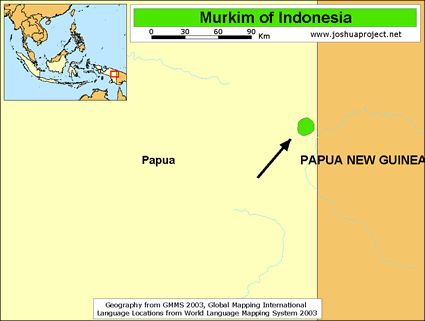The Murkim people live in the mountainous interior of Papua Province, Indonesia, specifically in the region of Milki?Village (Towe District, Keerom Regency) and Mot village in Pegunungan Bintang Regency.
They speak the Murkim language, which is a Papuan language of the South Pauwasi family, closely related (though still distinct) to Lepki and Kembra.
According to one ethnographic study the Murkim Tribe formerly lived in more dispersed hamlets within clan territories and only more recently (in the early 1990s and 2000s) built what is now Milki Village as a settled community.
Life for the Murkim people is remote and subsistence-based. Milki Village lies at high altitude (approx. 2,000 m above sea level) and is accessible only by single-engine aircraft; road access is extremely limited. Their social structure is divided into clans and sub-tribes (keret) under a war-chief system (Anokrum) reflecting their customary traditions in the highlands.
The economy is centered on sago processing, small-scale gardening, hunting and gathering, and other customary land-based activities.
A high proportion of the population is young: for example, the study of Milki Village found 82 % of residents were aged 0-30.
Educational attainment is extremely low: only around 16 % of the local population in Milki have received any formal schooling and there are no junior or senior high (or tertiary) graduates in the village.
Infrastructure is minimal – the village has a small elementary school (grades I-III), a simple village office, an airstrip built by the community, and a church from 2001.
According to the latest available data, the Murkim people are classified as entirely Muslim.
However, given the remote nature of the community and very low levels of external contact, detailed information about how Islam is practiced or how it interacts with traditional customs is scarce. The region's highland culture retains strong customary institutions (house-types, clan systems, war-chief roles) which suggests that elements of traditional belief and community ritual may persist alongside or beneath the formal religious identity.
They need access to quality education that enables local children beyond the primary level to attend junior and senior high, reducing drop-out caused by travel and cost burdens. They also need affordable transportation and infrastructure (roads, air links) so that goods, services, and economic opportunities are not solely dependent on expensive charter flights.
They need empowerment in land-and-forest tenure so that the Murkim clans can clearly secure customary rights and participate in development planning without internal conflict or external marginalization.
Regarding spiritual matters, they need spiritual engagement that honors their language and culture while making the gospel accessible in Murkim language (which currently has no known Bible translation).
Pray that God would open the eyes of the Murkim people to the saving knowledge of Jesus Christ, bringing genuine spiritual transformation in a people group with virtually no Christian presence.
Pray for the development of translated Biblical resources and discipleship materials in the Murkim language so that the message of the gospel can be understood in their heart language.
Pray for improved provision of education in Milki Village — for skilled teachers to serve, and for children to be able to pursue further schooling with dignity and hope.
Pray for safe, sustainable economic development and infrastructure in the region — that transport links, roads or air access become more affordable, enabling the Murkim to participate more fully in the wider economy and reducing the burden of isolation.
Scripture Prayers for the Murkim in Indonesia.
Wenehen, Agustinus & Maryuni, Agnes Eri. "Ethnography of Remote Custom Communities of Murkim Tribes in Keerom Regency – Papua." Sosiohumaniora, Vol 26, No 3 (Nov 2024): 495-505.
Jurnal Universitas Padjadjaran
Wikimedia / Ethnologue summary of th
| Profile Source: Joshua Project |











